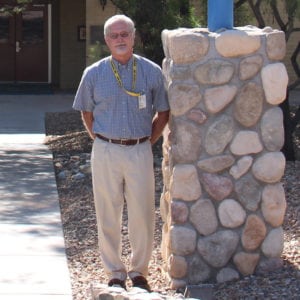By Brian Powell
Flinn Foundation
 Matt Walsh describes Fort Huachuca as “not on the beaten path to anywhere.”
Matt Walsh describes Fort Huachuca as “not on the beaten path to anywhere.”
But that is an advantage for the military base’s mission and United States national security, even as it adds layers of significance and challenge to Walsh’s role as the executive liaison assistant to the installation Commanding General on federal and state-level public-policy issues.
The Flinn-Brown Fellow, a civilian employee for the past 25 years at Fort Huachuca in Sierra Vista in southeastern Arizona, has spent the past 15 years in a role that elevates awareness and provides education about the United States Army installation and its assets to Arizona’s policymakers from the Governor’s Office to the Arizona Legislature to the U.S. Congress.
“Prior to 2003, I would say, policymakers in Maricopa County, for instance, weren’t aware of what we do, but I think that’s changed to a high degree,” Walsh says.
For example, recently Walsh hosted about 30 Arizona legislators as they spent the day touring and learning about the base.
Awareness was also bolstered by a 2017 report from the Phoenix-based Maguire Company, “Economic Impact of Arizona’s Principal Military Operations,” which concludes that Arizona’s military industry and the businesses those operations support provide about 76,000 jobs, $11 billion in economic output and $255 million in taxes each year to fund the operations of state and local governments—and maintaining these operations and jobs should be a priority. Fort Huachuca ranks among Arizona’s largest employers, with about 12,000 workers.
“We are a remote location, and people don’t typically come here, so this report helped put the Army in Fort Huachuca on the map in the state,” Walsh says.
Fort Huachuca, set in a high-altitude bowl surrounded by mountains about 75 miles from Tucson, is a training base for military intelligence and unmanned aircraft systems. The low-noise environment provides a unique opportunity to test communication equipment within the 2,500-square-mile Buffalo Solder Electronic Test Range, and provides restricted airspace isolated from commercial air-traffic corridors.
One reason Walsh engages with state leadership so often is because much of the testing goes beyond the boundaries of the base. Through the years, the Arizona Legislature has passed bills supporting these mission capabilities. Walsh also works with local Cochise County residents and businesses to ensure a positive relationship with the installation, especially regarding noise issues.
In addition, he makes multiple trips to Washington D.C. each year to meet with the Arizona congressional delegation and Pentagon officials.
In the early 2000s, Walsh was responsible for the base’s response during the Base Realignment and Closure process. In the end, Fort Huachuca was listed in the top 25 percent of all Army installations in the continental United States in terms of military value.
Walsh’s first experience working for the military came at the Sacramento Army Depot in 1985. His assignment was developing strategic business objectives and long-term modernization plans. When the facility was slated for closure, he was offered a job at Fort Huachuca and left his home state. Walsh was born in Fresno in California’s Central Valley. He graduated with a Bachelor of Science in industrial engineering from California State University, Fresno.
Flinn-Brown
Walsh, who already had experience working with Arizona policy leaders, said his primary attraction in applying for the Flinn-Brown Civic Leadership Academy was to understand a broader set of statewide policy issues and learn how different communities approached them.
“Flinn-Brown does a great job of bringing these issues to the front in a non-political and nonpartisan manner,” he says.
Walsh says he has stayed connected to the program and other Fellows through the Flinn-Brown Network, which now boasts more than 325 members since its founding in 2011.
Walsh says he has attended the annual legislative-preview and wrap-up sessions offered for Fellows at the Flinn Foundation in Phoenix. He also attends regular gatherings of southern Arizona Fellows in Tucson, which allows him to reconnect with the Fellows he knows, meet Fellows from other cohorts, and talk public policy. In early 2017, about 20 Flinn-Brown Fellows from throughout the state spent a day at Fort Huachuca learning about its operations.
As a federal government employee, Walsh is limited in his political involvement now, but he says that could change one day when he retires.
“I like the public-service arena. I’m a patriot; I like community service. I don’t think I will walk away in four or five years and sit on a porch and smoke a pipe,” Walsh says. “Being involved in the community is something I look forward to.”
The application for the 2019 Flinn-Brown Academy is now open. The Flinn-Brown seminar series will run from February through May and feature 14 sessions with well-known Arizona policy and political experts. The deadline to apply is November 12.